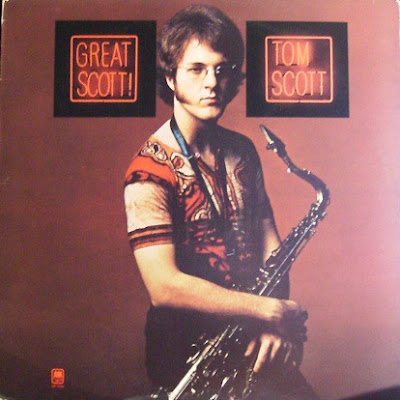Great Scott! was the fifth album composer and multi-reed player Tom Scott released under his own name. He was only 23 years old at the time, yet he’d already spent a good part of the previous decade honing his craft in the studios.
By the time of Great Scott!, Tom Scott had already developed a distinctive sound, particularly on both alto and tenor sax. But it wasn’t until this album that Scott clarified his style and personal approach – one that would guide him through his many successes later in the decade and throughout the remainder of his career.
Released in February 1972, after two albums a piece for the Impulse and Flying Dutchman labels (all produced by Bob Thiele), Great Scott! makes more of a case for Scott as a headliner than any of his previous albums had. Notably, for a change, without any gimmicks.
Even the title – based on an even-then antiquated saying conveying a surprised amazement – makes the claim that Tom Scott had finally arrived.
It is Scott’s only album on Herb Alpert’s A&M label, but it comes on the heels of such A&M productions by Stephan Goldman for Roger Kellaway and Gerry Mulligan, which also featured Scott. All sought crossover appeal that, weirdly, never seemed to happen.
Joining Scott here are fellow studio pros Howard Roberts (whose 1969 album Spinning Wheel prominently featured Scott) on guitar, Mike Wofford on keyboards, Jerry Scheff on bass, Emil Richards on percussion and fellow L.A. Express co-founders Larry Carlton on guitar and John Guerin on drums.
The more composed “Liberation” is conducted by Roger Kellaway and adds Victor Feldman (in whose quartet Scott was often featured) on percussion, Bud Shank and several other wind players as well as Ray Brown on Fender Bass(!).
Six of the album’s eight songs are Scott originals and seamlessly display how the composer excels in various shades of jazz – from the refreshingly catchy stuff he’s well-known for to the moody pieces that ably suit a soundtrack. In that way, Scott aligns with fellow film composers and jazz peers Lalo Schifrin (Scott had recently factored on Schifrin’s Rock Requiem) and, notably, Dave Grusin, both of whom Scott has worked with extensively.
Highlights include the proto-L.A. Express-like “Lookin’ Out for Number Seven” (with Scott on electric sax) – also the album’s only single release – the surprisingly Don Cherry shades of “Mantra” (with Scott overdubbing himself on flutes and vocals) and the breezy California ballad “Malibu,” which finds Scott beautifully transitioning from clarinet to alto sax seemingly without a break.
Scott again shows his affinity here for John Coltrane – he’d earlier covered “Naima” and wrote a piece called “With Respect to John Coltrane” – with a hard blues take on “Dahomey Dance.” Originally from the 1961 album Olé Coltrane, “Dahomey Dance” would be revisited by Scott on the 1974 album Tom Scott and the L.A. Express and again on the 1990 disc Them Changes.
Perhaps the album’s centerpiece is Scott’s genuinely inspired slow-blues take on Joni Mitchell’s “Woodstock.” Mitchell’s tremendous anthem was a 1970 hit for Crosby, Stills, Nash & Young – who were actually there – among others. Scott’s cover here was a jazz first for the song.
Scott plays the melody on recorder, which gives the song the haunting touch of an elegy – a side of the song Mitchell’s lyrics hint at: “We are billion-year-old carbon” and especially the verse “And I dreamed I saw the bomber-jet planes/Riding shotgun in the sky/Turning into butterflies/Above our nation.” (The 2017 cover of “Woodstock” on the DeJohnette/Grenadier/Medeski/Scofield disc Hudson is similarly inclined.)
According to a 1974 Rolling Stone article, Joni Mitchell’s sound engineer Henry Lewy had heard Scott’s version of “Woodstock” and asked if he would bring a copy to the studio where they were working on Mitchell’s album For the Roses.
Scott complied and “Joni was knocked out.” She asked Scott if he would play on her album: “I said, ‘Of course, “I’d love to.” The following year, when Scott formed the L.A. Express, the group not only opened for Mitchell but became her back-up band – her first experience performing with a band. Scott would later factor largely on Mitchell’s Court and Spark and Miles of Aisles (both 1974).
Great Scott! seems to have come and gone with surprisingly no critical attention over the years. The album did, however, hit number 20 on Billboard’s Jazz chart and earned Scott his very first Grammy nomination for “Best Improvised Jazz Solo Performance,” which he lost to Gary Burton’s Alone at Last.
The album was reissued in 1982 as an audiophile edition (with a different cover) but, to date, it remains unissued on CD and streaming services. If Great Scott! isn’t necessarily “great Scott” – like many of the records the saxophonist put out between 1974 and 1979 – it certainly is “pretty good Scott” and worthy of a few spins of appreciation.




No comments:
Post a Comment